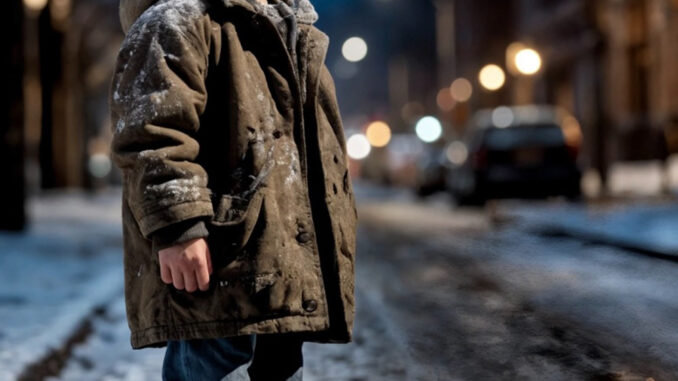
Outside, Christmas lights glowed in windows, trees reflected in glass, and festive music played. But beyond the walls, snow fell in silence—thick, sacred, untouched. No footsteps, no voices—just wind and the soft hush of falling flakes.
Kolya Sukhanov stood on the porch, unable to believe what was happening. The cold cut through him. A backpack in the snow reminded him it was real.
“Get out! I never want to see you again!” his father shouted. The door slammed shut.
His mother? She stood silent. Didn’t speak. Didn’t stop it. Just folded her arms and bit her lip.
Kolya stepped into the snow, his slippers soaked. Inside, he felt hollow.
No one needs you. Not even them.
He didn’t cry. Just walked—nowhere in particular. Past laughing families and glowing windows. Alone. While the city celebrated.
He wandered for hours. Chased away from entrances. Avoided by strangers. Unwanted.
That was the beginning—his first winter of loneliness. Of survival.
He slept on benches, in underpasses. Ate scraps, once stole a bun—not out of malice, but hunger. He found shelter in a damp basement. It stank, but it was warm.
One day, an old man found him. Left food. Said little. But once murmured, “Hang in there, kid. People are bastards. But you—you’re not like that.”
Kolya clung to those words.
Later, feverish and frozen, he collapsed. He was found by Anastasia Petrovna, a social worker. She held him and said, “Everything will be fine. Hear me?”
He heard.
She brought him to a shelter. Clean sheets. Hot food. A bed. Safety.
She visited daily. Brought real books—Chekhov, Kuprin, the Constitution.
“Know your rights. That makes you strong,” she told him.
He read. Grew. Wanted to protect others. To be someone who didn’t walk past.
At eighteen, he passed his exams, entered law school, worked nights cleaning floors. Tired, hungry—but determined.
In his second year, he volunteered at a legal clinic. By the fourth, he was helping real clients—especially those with nothing.
At 26, he worked in a law firm but still offered free help. Kids from shelters, women, the elderly—none left alone. He remembered what it meant to be unwanted. He swore no one else would feel that again.
His parents never returned. He never searched.
But one winter, they appeared in his office. A bent man. A woman in a headscarf.
“Kolya… forgive us.”
He didn’t shout. Just said, “You’re late. I died for you that night. And you for me.”
He held the door open.
“I wish you health. But there’s no way back.”
They left.
He returned to his desk, opened a new case—about a runaway teen.
Everything he’d endured made him who he was. Someone who could now say:
“I’m here. You’re not alone.”
And in his mind, Anastasia Petrovna’s words echoed:
“Rights are your shield. Even if you have nothing.”
Now he was that shield—for those still standing barefoot in the snow.